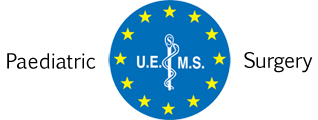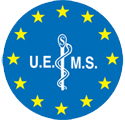1. General Rules of CME
1.1 Definition
Continuing Medical Education (CME) is a programme of educational activities to guarantee the maintenance and upgrading of knowledge, skills and competence following completion of Postgraduate training. CME is an ethical and moral obligation for each Paediatric Surgeon throughout his/her professional career in order to maintain the highest possible professional and continually rising standards of the medical care provided to the population. It consists of the continuous renewal, extension and updating of scientific knowledge and technical skills necessary to maintain these professional standards. UEMS Section of Paediatric Surgery as well as the European Board in Paediatric Surgery (from now on: the Board) recommends CME as the most important and efficacious method for keeping abreast of the newest techniques and information in our speciality and for maintaining and enhancing competence.
1.2. Credit system
A credit is a unit of CME and corresponds basically to one hour of educational activity. One credit does not have to be always identical with a clock hour, but can be different depending on the type of education (D9909). Credits will be awarded according to the CME activity involved (§1.3.).
The initial basic minimum target for CME is 50 credits per year. In one year not more than 100 credits should be recognised (D9907).
There should be an appropriate mix of CME activities, with at least 25 hours being spent on External CME activities and at least 25 of Internal CME activities (§ 1.3.).
Though the workings of the system and individual participation will be reviewed annually, the cycle will be five-yearly for a total of at least 250 credits. Out of these 250 credits, at least 100 should be in external formally planned CME and 100 in internal personal learning activities (D9907).
In cases where 250 credits are not achieved there will be an appeal system for extenuating circumstances. Paediatric Surgeons who fail to achieve 250 credits in 5 years should receive counselling from the National Professional Authority or the Board itself.
Credits in excess of the required 250 will not be carried forward into the following 5 year cycle.
Credits cannot be earned for service on committees or working parties whether local, national or international.
1.3. Categories of CME
CME activities are classified in two categories: as a general rule External CME activities must be formally approved beforehand (§ 4.1.1.), while Internal CME activities should not (§ 4.1.2.).
1.3.1. External formally planned CME
Ext - 1 : Scientific Congress, EACCME registered
Ext - 2 : Scientific Congress, no EACCME registered (local)
Ext - 3 : Courses, Workshops, Seminars
Ext - 4 : Distance learning programs
1.3.2. Internal CME
Int - 1 : Hospital based CME
Postgraduate meetings, Research meetings, Department meetings, Hospital grand rounds, Journal club, Clinical outcome meetings (audit)
Int - 2 : Independent based CME
Reading medical literature, medical writing, editorial or refereeing work, Internet learning, self assessment examination, medical audiotapes and videos
Int - 3 : Other CME activities
Visit to specialised units, preparation and delivery of formal lecture or seminar, preparation and delivery of audit report, publication or presentation ofscientific papers or books, teaching, postgraduate examination work
CME activities (awarding of credits)
External Minimum: 25 credits / year
Ext - 1 : Scientific Congress (1 credit/hour, max 25 credits)
EACCME registered
Ext - 2 : Scientific Congress (1 credit/hour, max 15 credits)
Ext - 3 : Courses, Meetings, Seminars (1 credit/hour, max 10 credits)
Ext - 4 : Distance learning programs (1 credit/hour, max 10 credits/program)
Internal Minimum: 25 credits / year
Int - 1 : Hospital-based (1 credit per meeting - Supporting documentation to be provided)
Postgraduate meetings,
Research meetings,
Department meetings,
Hospital grand rounds,
Journal club,
Clinical outcome meetings (audit)
Int - 2 : Independent-based (Maximum 10 credits/year)
Reading medical literature,
Preparing lectures,
Medical writing,
Editorial or refereeing work,
Internet learning,
Self assessment examination,
Medical audiotapes and videos
Int - 3 : Other activities
Visit to specialised units (10 credits/week)
Preparation and delivery of (3 credits - Supporting documentation to be provided)
formal lecture or seminar/audit report
Publication of books (Up to 10 credits per chapter)
Postgraduate examination work (1 credit/day, max 5 credits/year)





